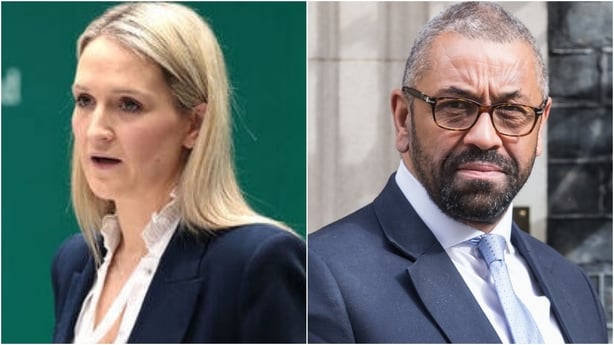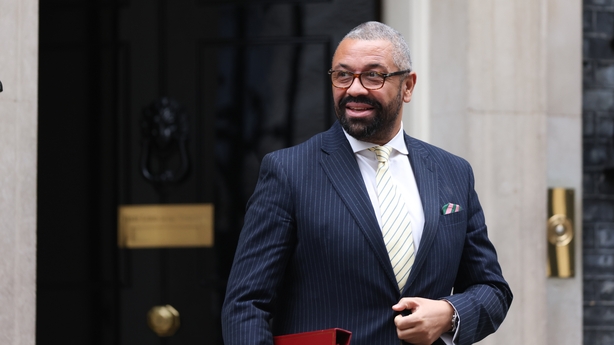British Prime Minister Rishi Sunak has said he is "not interested" in pursuing a deal with the Government on returning asylum seekers from Ireland to the UK.
Mr Sunak told ITV News: "We're not interested in that. We're not going to accept returns from the EU via Ireland when the EU doesn't accept returns back to France where illegal migrants are coming from.
"Of course we're not going to do that."
Asked whether there were any negotiations with the European Union on returns, he said: "No. I'm focused on getting our Rwanda scheme up and running."
Responding to the comments, a spokesperson for the Taoiseach said: "Ireland already shares a common travel area with the UK.
"We are looking at legislation to facilitate the 2020 arrangement that was in place up until last month when the Irish High Court ruled the UK couldn't be designated a safe country.
"The Minister for Justice will bring proposals to cabinet tomorrow."
.@RishiSunak categorically rules out an asylum seeker return scheme with Ireland or the EU to @Peston
— ITV News Politics (@ITVNewsPolitics) April 29, 2024
'Of course we're not going to do that...
'I'm very confident that our [Rwanda] scheme is compliant with our international obligations'https://t.co/GWbn99iAMa pic.twitter.com/BQWIqfupD7
Meanwhile, Tánaiste and Minister for Foreign Affairs Micheál Martin said that Minister for Justice Helen McEntee and UK Home Secretary James Cleverly would meet "in the coming weeks" after their meeting on Monday was postponed.
Mr Martin was speaking after a meeting of the British-Irish Intergovernmental Conference, which he described as "constructive" and "warm".
He said that Minister McEntee and Mr Cleverly will "pick these issues up again in respect of the mutual arrangements between our two countries".
A spokesperson for the British Home Office said the meeting with Ms McEntee had been cancelled because of a "diary clash".
The Department of Justice has confirmed that it will be rescheduled in the near future.
They had been due to meet to discuss "strengthening" the Common Travel Area, but the meeting was postponed late on Sunday night.
Some sources within the Irish Government have speculated that the UK may have pulled out of the encounter because British administration did not want to appear to be co-operative with Ireland on migration ahead of local elections on Thursday.
Ms McEntee had said she intended to discuss the cross-border migration row.

Mr Martin said that when people present for asylum there "are set procedures" and "their application is dealt with in accordance with the law".
"Our focus is speeding up those processes and we have designated more safe countries, for example, which has had results in reducing the numbers seeking asylum from those countries.
"Apart all together from the specific issue in terms of the Common Travel Area, we've been taking a range of measures and we'll be taking more to try reduce the pressure on our system.
"That's the focus of our approach," Mr Martin said.
He added that the way to work through issues such as migration is "further engagement and dialogue".
"The whole situation has changed very significantly in a short space of time and we've got to adapt our system and approaches to meet that."
Mr Martin and Northern Ireland Secretary Chris Heaton-Harris co-chaired the British-Irish Intergovernmental Conference in London.
The migration issue was not originally planned to be on the agenda with one of the main issues expected to be the British government's Legacy Bill which will grant amnesties and halt legal actions concerning killings during the Troubles.
The Cabinet is preparing to examine laws to allow asylum applicants to be returned from Ireland to the UK this week.
Taoiseach Simon Harris said on Sunday that Ireland will not "provide a loophole" for the migration challenges in other countries.
Mr Harris said that while every country is entitled to its own migration policy, he does not intend to allow the policies of others to "affect the integrity of our own one".

Mr Sunak said this shows his government's so-called Rwanda policy is working as a deterrent.
The UK government has rejected any bid by Ireland to return asylum seekers unless France agrees to do the same with boats crossing the English Channel.
The Rwanda policy will see asylum seekers coming to the UK being placed on a one-way flight to the east African nation, with the aim of deterring others from crossing the English Channel on small boats.
The legislation ensuring the plan is legally sound, the Safety of Rwanda (Asylum and Immigration) Act, cleared its passage through the UK Parliament this week and was signed into law on Thursday.
Alliance Party MP for North Down Stephen Farry described the bill as a "truly horrible piece of legislation."
Speaking to RTÉ's News at One, he he said: "There are are issues here that do need to be addressed and the two governments need to work together, but clearly that is not happening.
Mr Farry said it was not practical to conduct sea crossing checks between Britain and Northern Ireland and that doing anything on the land border in Ireland would be politically and practically impossible.
Fine Gael Senator Barry Ward said he did not know why Mr Sunak was talking about a deal because there was already an existing agreement in place, which "benefits citizens from both side".
Speaking on RTÉ's Drivetime, Mr Ward said there was a deal done between Ireland and Britain post-Brexit to accept returns from both countries and he was "not aware of any problem with its operation at the moment".
He added that he would be surprised in the British government would want to undo the current deal.
Speaking on the same programme, the SDLP's Matthew O'Toole said the Rwanda policy was "abhorrent".
"People arriving on our shores who require human and efficient processing... in a way that respects them as human beings," he said.
Additional reporting John Kilraine, David Murphy

